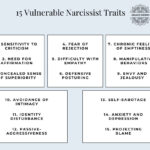10 Symptoms of Daughters of Narcissistic Fathers
Discovering the 10 symptoms of daughters of narcissistic fathers opens a window into their unique challenges. This article sheds light on how a narcissist dad’s behavior shapes his daughter’s life.
We’ll explore the emotional landscape these daughters navigate, from self-doubt to resilience. Join me as we delve into their world, aiming to understand, empathize, and guide those on a journey of healing and self-discovery.
Understanding the 10 Symptoms of Daughters of Narcissistic Fathers
Understanding the 10 symptoms of daughters of narcissistic fathers is crucial for recognizing the unique struggles they face. These symptoms reflect the deep emotional impact of having a narcissist father, shaping their personalities and life experiences.
Here’s a list of the 10 symptoms:
- Chronic Self-Doubt: Struggling with confidence due to constant criticism.
- Fear of Rejection: Heightened anxiety about being dismissed or unloved.
- Difficulty Trusting Others: Stemming from betrayal or manipulation by the narcissist dad.
- Excessive Need for Validation: Seeking approval due to lack of paternal affirmation.
- Emotional Sensitivity: Overly reactive to emotional stimuli, a sign of a narcissistic father.
- Troubled Relationships: Patterns of instability in relationships, mirroring those with their father.
- Perfectionism: Striving for flawlessness to please their narcissist fathers.
- Lack of Boundary Setting: Difficulty in asserting needs or saying ‘no’, a common effect of a narcissistic father.
- Fear of Abandonment: Persistent worry about being left, rooted in childhood experiences.
- Self-Sabotaging Behaviors: Unconsciously mimicking negative aspects of the relationship with their father.
Related: Karma Narcissist Quotes
Identifying a Narcissist Father: Key Traits and Signs
Identifying a narcissist father involves recognizing key traits and signs that define this personality type. These characteristics often lead to specific behaviors that can profoundly impact family dynamics, especially with daughters.
Here are some signs and key traits of a narcissist father:
- Lack of Empathy: Shows little regard for others’ feelings.
- Need for Admiration: Constantly seeks attention and praise.
- Manipulative Behavior: Uses others for his own gains.
- Inflated Sense of Self-Importance: Believes he’s superior or special.
- Difficulty in Maintaining Relationships: Struggles with meaningful, long-term connections.
- Exploitative Attitude: Takes advantage of others without remorse.
- Emotional Unavailability: Often distant and unresponsive to emotional needs.
- Overly Critical: Harsh and demeaning in criticism, particularly towards family.
- Controlling Nature: Desires to dictate others’ choices and behaviors.
- Lack of Responsibility: Avoids accountability for his actions.
The Unique Challenges for Daughters of Narcissistic Fathers
Daughters of narcissistic fathers face a set of unique challenges that can deeply affect their emotional well-being and personal development. These challenges often stem from the complex, often toxic dynamics created by a narcissist dad.
Here’s a list of some of the unique challenges that daughters face when having a narcissistic father:
1. Emotional Turmoil:
Growing up with a narcissistic father can lead to a rollercoaster of emotions. Daughters may experience intense feelings of love and hate, often feeling bound by a sense of duty or loyalty to their father despite the pain he causes. This emotional turmoil is exacerbated by the father’s unpredictable moods and reactions.
2. Self-Identity Issues:
Narcissistic fathers often project their desires and failures onto their daughters, leaving them with a confused sense of self. Daughters may struggle to develop a strong, independent identity, constantly seeking approval or fearing disapproval from their father. This can lead to a lifetime of trying to meet impossible standards.
3. Relationship Patterns:
The model of a narcissistic father significantly impacts how daughters perceive and engage in relationships. They might either mirror the toxic traits of a narcissist they observed or find themselves repeatedly attracted to similar narcissistic personalities, perpetuating a cycle of emotional abuse.
4. Boundaries and Autonomy:
Daughters of narcissistic fathers often have difficulty setting boundaries with a narcissist. They might feel responsible for their father’s emotional well-being or fear the repercussions of asserting their own needs and desires. This lack of autonomy can hinder personal growth and decision-making in adulthood.
5. Trust Issues and Intimacy:
Having a narcissist father can result in deep-seated trust issues. Daughters might find it hard to open up and be vulnerable in relationships, fearing betrayal or manipulation. This can lead to difficulties in forming deep, meaningful connections.
6. Healing and Recovery:
Despite these challenges, many daughters of narcissistic fathers embark on a journey of healing from narcissistic abuse. Acknowledging the impact of their upbringing, seeking therapy, and connecting with others who have similar experiences are crucial steps towards recovery. This journey often involves redefining their self-worth, learning to set boundaries, and cultivating healthy relationships.
These challenges, while daunting, also offer an opportunity for growth and empowerment. Daughters of narcissistic fathers can develop remarkable resilience, empathy, and a deeper understanding of themselves and others.
The Impact of Narcissistic Fathers on Daughter’s Well-being
The impact of narcissistic fathers on daughters is profound, shaping their emotional landscape and well-being. These fathers often imprint lasting effects on their daughters’ self-esteem, mental health, and relationships.
Daughters may develop diminished self-worth, stemming from conditional paternal love. This often leads to a relentless pursuit of perfection and approval. Mental health issues like anxiety and depression are common, as daughters internalize their fathers’ critical voices, creating persistent self-doubt and feelings of inadequacy.
The psychological toll is significant, necessitating healing and supportive environments. According to the study Brain Inform. 2021 Dec; 8(1): 4., such paternal influences can lead daughters to mimic or reject their father’s narcissistic behaviors, affecting their online and offline interactions. This underscores the complex dynamics at play between narcissistic fathers and their daughters, and the need for focused support and narcissist abuse therapy for these daughters.
Signs of a Narcissistic Father in Family Dynamics
Recognizing the signs of a narcissistic father in family dynamics is essential to understanding their impact. These signs often reveal how a narcissistic father’s behavior shapes the family environment and specifically, what he does to his daughters.
Here are some key signs of a narcissist father:
- Dominating Family Conversations: Often centers discussions around himself.
- Lack of Empathy: Shows little understanding or concern for family members’ feelings.
- Manipulative Behavior: Uses emotional tactics to control family members.
- Need for Admiration: Seeks constant attention and praise from the family.
- Disregard for Boundaries: Invasively interferes in personal matters of family members.
- Creating a Tense Home Environment: His mood dictates the household’s emotional climate.
- Imposing Unrealistic Expectations: Places heavy, often unachievable demands on his daughters.
- Criticism and Blame: Frequently criticizes and blames others, avoiding personal accountability.
- Gaslighting: Makes family members doubt their own perceptions and feelings is a classic sign of narcissist gaslighting.
- Lack of Genuine Support: Offers conditional support, often tied to his own interests.
What Narcissistic Fathers Do to Their Daughters: A Deep Dive
What narcissistic fathers do to their daughters can leave a lasting impact. Life with a narcissistic father often involves navigating a complex emotional landscape. Daughters might experience emotional neglect or manipulation, where their needs and feelings are disregarded. Narcissistic fathers may also impose unrealistic expectations, constantly pushing their daughters to meet high standards for his approval.
For example, a narc father who harshly criticizes his daughter’s grades or appearance, significantly impacting her self-esteem and mental well-being.
Emotional outbursts or cold indifference from the father can become a common occurrence, deeply affecting the daughters’ self-esteem and mental health. In some cases, daughters might find themselves acting as the emotional caretaker for their fathers, reversing traditional parent-child roles.
These experiences can shape a daughter’s personality, relationships, and outlook on life, making the journey of self-healing from narcissistic abuse and autonomy challenging yet essential.
The Bond Between Narcissistic Fathers and Their Daughters
The bond between narcissistic fathers and their daughters is often a complex mix of intense emotions and challenging dynamics. Typically, this bond is characterized by inconsistency and emotional volatility.
Narcissistic fathers may alternate between over-involvement and complete neglect in their daughters’ lives. This unpredictability can leave daughters in a constant state of emotional flux, unsure of where they stand.
Daughters may also experience a false sense of responsibility for maintaining the relationship’s stability, often feeling compelled to meet their father’s needs and expectations at the expense of their own.
This dynamic can lead to an unhealthy attachment style, where daughters find themselves continuously seeking approval and validation from their fathers, only to be met with criticism or indifference.
Such a bond heavily impacts the daughter’s self-perception and her relationships with others. She might struggle with self-worth, find difficulty in trusting others, or replicate similar unhealthy patterns in other relationships.
The journey towards understanding and healing from this complex bond is crucial for daughters to establish their sense of self and forge healthier relationships in the future.
Healing and Recovery for Daughters of Narcissistic Fathers
Healing and recovery for daughters of narcissistic fathers is a journey of self-discovery and empowerment. It involves recognizing the impact of their upbringing and taking proactive steps to heal.
Steps for healing include:
- Seek Therapy: Professional guidance can offer valuable insights and coping strategies.
- Establish Boundaries: Learning to set healthy boundaries with their father and others.
- Cultivate Self-Compassion: Replacing self-criticism with kindness and understanding.
- Build Support Networks: Connecting with others who have similar experiences.
- Practice Self-Care: Engaging in activities that promote emotional and physical well-being.
- Explore Personal Interests: Rediscovering personal passions and hobbies.
- Develop Mindfulness: Practicing mindfulness to stay grounded in the present.
- Empower Through Knowledge: Educating oneself about narcissism and its effects.
- Reframe the Narrative: Changing the internal narrative from victimhood to survivorship.
- Celebrate Progress: Acknowledging and celebrating each step forward.
If you’re struggling to heal from narcissistic abuse, I warmly welcome you to my Narcissistic Abuse Recovery Program. It’s an easy self-paced online course which you can do at your own pace. My signature program combines scientific and spiritual tools for holistic healing of the body, mind, and spirit.
FAQs on Symptoms of Daughters of Narcissistic Fathers
Narcissistic fathers often impose unrealistic expectations on their daughters, seeking validation through their achievements. They may emotionally manipulate or neglect them, affecting their self-esteem and mental health. This can lead to daughters struggling with self-worth, trust issues, and replicating unhealthy relationship patterns.
Narcissist fathers may abandon their families due to their inability to form deep, empathetic connections. Their self-centered nature and lack of emotional investment can make them leave when they no longer benefit from the relationship. This abandonment often stems from their pursuit of personal gratification over familial responsibilities.
Outsmarting a narcissistic father involves setting firm boundaries and maintaining emotional distance. It’s important to avoid engaging in their manipulative tactics and remain calm during interactions. Seeking therapy can provide strategies to handle their behavior. It’s crucial to prioritize your own mental health and well-being in these situations.
Related:
10 Symptoms of Daughters of Narcissistic Mothers
Things Narcissistic Mothers Say to Sons & Daughters







